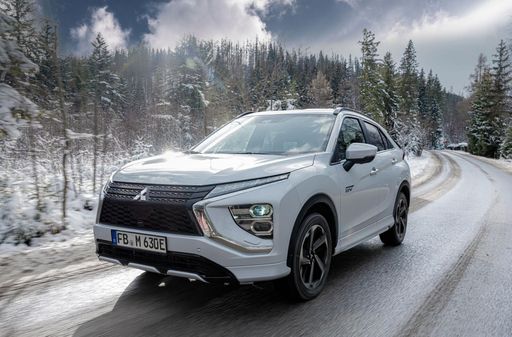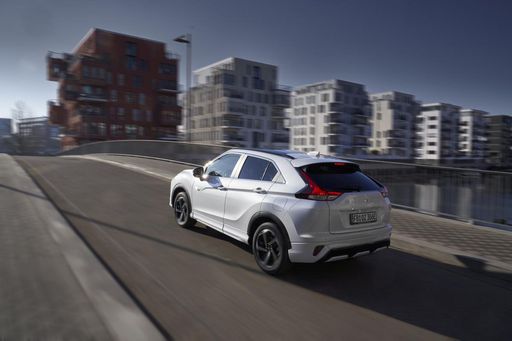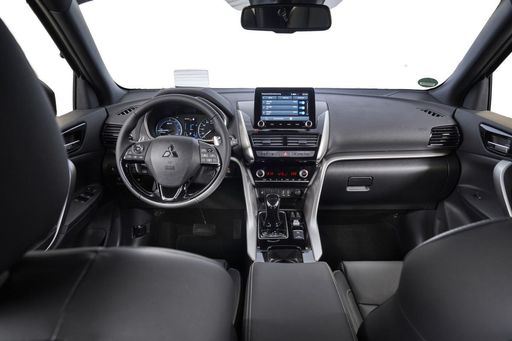Hyundai Bayon vs Mitsubishi Eclipse Cross – Differences & prices compared
Compare performance, boot space, consumption and price in one view.
Find out now: which car is the better choice for you – Hyundai Bayon or Mitsubishi Eclipse Cross?
The Hyundai Bayon (SUV) comes with a Petrol engine and Manuel or Automatic transmission. In comparison, the Mitsubishi Eclipse Cross (SUV) features a Plugin Hybrid engine with transmission.
When it comes to boot capacity, the Hyundai Bayon offers 411 L, while the Mitsubishi Eclipse Cross provides 359 L – depending on how much space you need. If you’re looking for more power, decide whether the 100 HP of the Hyundai Bayon or the 188 HP of the Mitsubishi Eclipse Cross suits your needs better.
In terms of consumption, the values are 5.40 L per 100 km for the Hyundai Bayon, and 2 L for the Mitsubishi Eclipse Cross.
Price-wise, the Hyundai Bayon starts at 20100 £, while the Mitsubishi Eclipse Cross is available from 36000 £. Compare all the details and find out which model fits your lifestyle best!
Hyundai Bayon
The Hyundai Bayon is a compact crossover that effortlessly merges practicality with modern design. Its sleek exterior and spacious interior make it an ideal choice for urban settings and longer journeys alike. With a focus on comfort and connectivity, this vehicle provides a smooth driving experience paired with advanced technology features.
details @ hyundai.news
@ hyundai.news
 @ hyundai.news
@ hyundai.news
 @ hyundai.news
@ hyundai.news
 @ hyundai.news
@ hyundai.news
 @ hyundai.news
@ hyundai.news
Mitsubishi Eclipse Cross
The Mitsubishi Eclipse Cross presents a sleek fusion of dynamic design and versatile functionality, perfect for urban adventures and weekend getaways alike. Its elegant lines and bold front grille make a strong statement on the road, while its well-appointed interior offers a comfortable and connected driving experience. With advanced safety features and intuitive technology, the Eclipse Cross ensures drivers feel secure and in control, whether navigating city streets or scenic routes.
details @ Mitsubishi Motos
@ Mitsubishi Motos
 @ Mitsubishi Motos
@ Mitsubishi Motos
 @ Mitsubishi Motos
@ Mitsubishi Motos

|

|
|
|
|
Costs and Consumption |
|
|---|---|
|
Price
20100 - 25800 £
|
Price
36000 - 42000 £
|
|
Consumption L/100km
5.4 - 5.5 L
|
Consumption L/100km
2 L
|
|
Consumption kWh/100km
-
|
Consumption kWh/100km
-
|
|
Electric Range
-
|
Electric Range
45 km
|
|
Battery Capacity
-
|
Battery Capacity
-
|
|
co2
124 g/km
|
co2
46 g/km
|
|
Fuel tank capacity
40 L
|
Fuel tank capacity
43 L
|
Dimensions and Body |
|
|---|---|
|
Body Type
SUV
|
Body Type
SUV
|
|
Seats
5
|
Seats
5
|
|
Doors
5
|
Doors
5
|
|
Curb weight
1170 - 1195 kg
|
Curb weight
1985 - 2052 kg
|
|
Trunk capacity
411 L
|
Trunk capacity
359 L
|
|
Length
4180 mm
|
Length
4545 mm
|
|
Width
1775 mm
|
Width
1805 mm
|
|
Height
1500 mm
|
Height
1685 mm
|
|
Payload
460 - 465 kg
|
Payload
373 - 440 kg
|
Engine and Performance |
|
|---|---|
|
Engine Type
Petrol
|
Engine Type
Plugin Hybrid
|
|
Transmission
Manuel, Automatic
|
Transmission
-
|
|
Transmission Detail
Manual Gearbox, Dual-Clutch Automatic
|
Transmission Detail
-
|
|
Drive Type
Front-Wheel Drive
|
Drive Type
All-Wheel Drive
|
|
Power HP
100 HP
|
Power HP
188 HP
|
|
Acceleration 0-100km/h
11.3 - 12.4 s
|
Acceleration 0-100km/h
10.90 s
|
|
Max Speed
176 - 179 km/h
|
Max Speed
162 km/h
|
|
Torque
172 - 200 Nm
|
Torque
-
|
|
Number of Cylinders
3
|
Number of Cylinders
4
|
|
Power kW
74 kW
|
Power kW
138 kW
|
|
Engine capacity
998 cm3
|
Engine capacity
2360 cm3
|
General |
|
|---|---|
|
Model Year
2024
|
Model Year
2021 - 2022
|
|
CO2 Efficiency Class
D
|
CO2 Efficiency Class
B
|
|
Brand
Hyundai
|
Brand
Mitsubishi
|
Hyundai Bayon
Introducing the Hyundai Bayon: A New Era in Compact SUVs
The Hyundai Bayon, a compact SUV designed with urban adventurers in mind, is making waves with its exceptional blend of style, performance, and technology. The brand has pulled out all the stops to ensure that the Bayon stands out in the crowded SUV market, offering a vehicle that is both practical and innovative.
Sleek Design and Cutting-Edge Aerodynamics
The Bayon features a striking exterior design, characterised by its bold lines and angular shapes. With a length of 4180 mm, a width of 1775 mm, and a height of 1500 mm, the Bayon commands attention with its modern appeal and aerodynamic efficiency. These dimensions not only contribute to its sleek design but also enhance fuel efficiency, achieving an impressive 5.4 L/100 km.
Engine Performance and Specifications
Under the bonnet, the Bayon is powered by a 1.0-litre T-GDI petrol engine, delivering a robust 100 PS or 74 kW. This engine is available with either a manual or automatic gearbox, meeting varied driver preferences. The front-wheel-drive system complements its urban-centric design, ensuring a smooth and responsive ride.
Maximised Interior Space and Comfort
The spacious interior of the Bayon accommodates up to five passengers comfortably. The vehicle boasts a boot space of 411 litres, perfect for both everyday use and weekend getaways. The cabin is designed with practicality and technology in mind, with intuitive controls and ample storage options.
Advanced Technology and Connectivity
Hyundai has equipped the Bayon with state-of-the-art technology to enhance the driving experience. The SUV features a high-resolution touchscreen, offering seamless connectivity with Apple CarPlay and Android Auto. Safety is also a priority, with multiple driver assistance systems including lane-keeping assist and forward collision avoidance assist.
Environmental Efficiency
Despite its powerful performance, the Bayon achieves a respectable CO2 efficiency class of D, with emissions as low as 122 g/km. This balance between performance and environmental responsibility makes the Bayon an attractive option for conscientious drivers.
Affordability and Market Appeal
The Hyundai Bayon is competitively priced, ranging from €22,900 to €29,600. Its affordable running costs, estimated at 32.3 to 36.4 cents per kilometre, further enhance its appeal to budget-conscious consumers. With monthly costs ranging from €806 to €909, the Bayon provides excellent value without compromising on features or performance.
Final Thoughts
The Hyundai Bayon truly stands out in the compact SUV segment, combining style, innovation, and practicality in an appealing package. It offers a versatile driving experience suited to the demands of modern urban living, making it a top contender in its class. As Hyundai continues to champion forward-thinking design and technology, the Bayon is a testament to the company's ongoing commitment to excellence.
Mitsubishi Eclipse Cross
Unveiling the Mitsubishi Eclipse Cross: A Pioneer in Innovation
The Mitsubishi Eclipse Cross has captivated the automotive world since its introduction. This SUV merges the heritage of Mitsubishi's Eclipse sports coupe with the robust aesthetics of a modern crossover, creating a vehicle that stands out both on urban roads and open highways. Let's delve into the innovative features and technical details that define this remarkable vehicle.
Powerful Hybrid Performance
At the heart of the Mitsubishi Eclipse Cross is its cutting-edge plug-in hybrid engine. With a power output of 188 PS (138 kW), this hybrid marvel combines a traditional 2.4-litre petrol engine with an advanced electric motor, delivering an impressive fuel economy of just 2 litres per 100 km. Not only does it offer optimal performance, but it also commits to eco-friendliness with a CO2 emission rated at a mere 46 g/km.
All-Wheel Drive for Unmatched Control
The Eclipse Cross comes equipped with an all-wheel-drive system, ensuring traction and stability across various terrains. This is particularly beneficial for drivers who venture beyond the smooth highways, providing confidence and control whether you're tackling slippery city streets or rugged countryside trails.
Design and Comfort: A Fusion of Style and Practicality
The striking design of the Mitsubishi Eclipse Cross is a fusion of style and functionality. Its dimensions, 4545 mm in length, 1805 mm in width, and 1685 mm in height, contribute to a spacious interior without compromising on an elegant silhouette. This SUV comfortably seats five passengers and boasts a generous boot space of 359 litres, ideal for family getaways or adventure trips.
Technological Advancements for Modern Drivers
Mitsubishi has integrated several technological advancements into the Eclipse Cross to enhance driving experience. The model offers an electric range of 45 km, perfect for daily commutes or short journeys without engaging the conventional engine. Additionally, its user-friendly infotainment system ensures connectivity and entertainment on the go.
Safety Features: Protecting What Matters Most
Safety is paramount in the design of the Eclipse Cross. It includes a selection of contemporary safety features to protect both passengers and pedestrians. With a CO2 efficiency class rated at B, it not only aims to safeguard its passengers with advanced collision mitigation systems but also to ensure a greener and more sustainable driving experience.
Value for Money: The Perfect Investment
Positioned with a price range between €41,990 and €48,990, the Mitsubishi Eclipse Cross offers substantial value considering its hybrid technology and comprehensive feature set. Additionally, with monthly costs ranging from €1,165 to €1,258 and cost per km between 46.6 and 50.3 cents, it is an economically sound choice for eco-conscious drivers looking for an efficient and reliable vehicle.
In conclusion, with its blend of hybrid power, all-wheel-drive capability, and a focus on innovation and safety, the Mitsubishi Eclipse Cross is an ideal candidate for those seeking a versatile and efficient SUV. Whether you're navigating city streets or cruising countryside roads, the Eclipse Cross promises a drive that is both exhilarating and responsible.
The prices and data displayed are estimates based on German list prices and may vary by country. This information is not legally binding.
